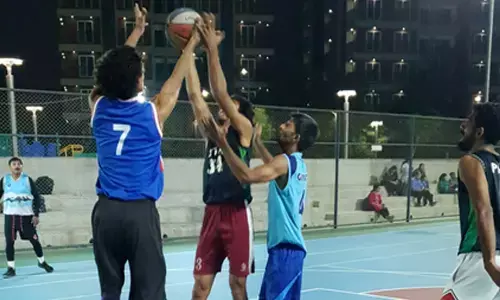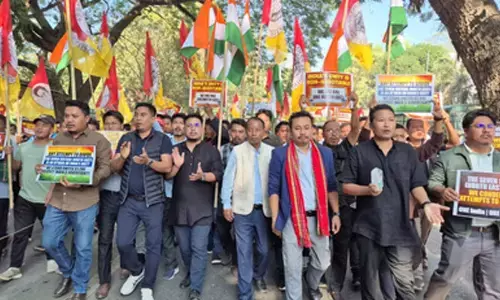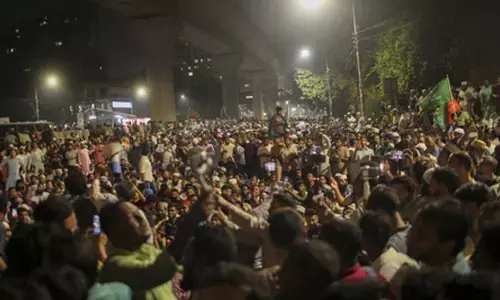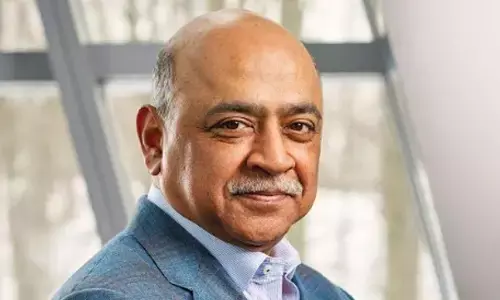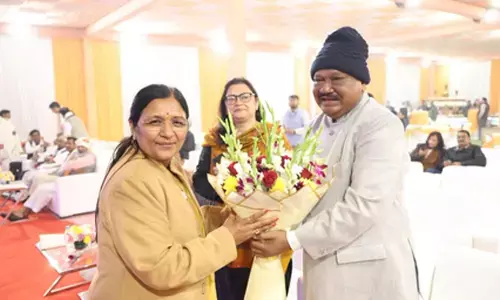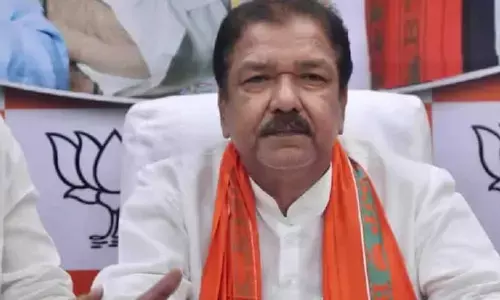Jashuva

Navayuga Kavi Chakravarti Gurram Jashuva who hailed from Vinukonda in Guntur district was one of the great Telugu poets of this century.
The legend from Guntur
Navayuga Kavi Chakravarti Gurram Jashuva who hailed from Vinukonda in Guntur district was one of the great Telugu poets of this century.
 His several literary works reflect the ugly face of casteism and how it tried to overshadow literary art which knew no caste religion or race. With a profound sense of social consciousness, he wrote many ‘khamda kaavyaalu’ which was moving.
His several literary works reflect the ugly face of casteism and how it tried to overshadow literary art which knew no caste religion or race. With a profound sense of social consciousness, he wrote many ‘khamda kaavyaalu’ which was moving.
Though his chosen style of poetry was of strict metre, the content reflects modern progressive thoughts. Jashuva worked for ten years as a teacher in an institute run by Lutheran Church in Guntur. From 1928 through 1942, he was a Telugu pundit in a high school in Guntur. During the Second World War (1942-45), he campaigned in the National War Campaign conducted by the Indian Government under the supervision of British government. For a couple of years (1957-1959), he worked as a producer in Madras Radio Station.
In 1964, he became a member of Andhra Pradesh Legislative Council. This was the same Jashuva who was not allowed to read his poetry by sharing the same dais shared by the poets and writers of Vinukonda! This was not only a proud moment for Jashuva, but also a vindication for the Andhra Society in overcoming the practice of segregation. Also, Jashuva’s third daughter Hemalata, a Christian, was married to Goparaju Ramachandrarao (Go-Ra)’s son Lavanam, an atheist brahmin.
Hemalata and Lavanam had never met before, but agreed to an inter-caste marriage arranged by their parents. They were married in Mahatma Gandhi's ashram in 1960 at Sevagram Jashuva was born in 1895 in Katragaddapadu to Virayya and Lingamma. Because of the intercaste alliance of his parents, their poverty and their caste, Jashuva's childhood was spent in alienation from close relatives, undergoing severe hardships and being subjected to inhuman treatment from the society which considered his caste untouchable. In spite of these enormous hurdles, Jashuva's parents raised him and his brother, Israel, as good Christians. Jashuva persevered against these hardships and graduated with Ubhaya Bhasha Praveena (scholar of Telugu and Sanskrit languages).
Despite being raised as a Christian, Jashuva often drew his inspiration from Hinduism and Hindu mythological epics. This angered his Christian society, which was quick to proscribe Jashuva's family from their community. This did not deter Jashuva who continued to write excellent poetry in Telugu. He was a school teacher initially, but lost his first job.
During this period of unemployment, he continued to put out wonderful poetry. It pained his sensitive heart however that scholars of "high caste" would appreciate his poetry and sing praises of it, then come to know of his caste and leave in disgust.
But the brilliance of his poetry, shone through the feeble attempts of society to cover it. He was recognised by literature and poetry lovers. He was employed again. Publishers came forward to publish his works. He received great acclaim and many accolades from far and near. Jashuva’s shining glory (he says) was when the eminent poet and scholar Chellapilla Venkata Sastry (half of the "Tirupati Vemkata kavulu" duo), a Brahmin, touched his ("an untouchable's") feet to adorn his ankle with the "Ganda Penderam" and proclaimed, "I am honoured to have touched the feet of this great poet".
Jashuva's many works include 'Gabbilam' arguably his most famous work, fashioned after Kalidasa's Megha Sandesam. In ‘Gabbilam’, however, it is not a yaksha using the cloud as a messenger to convey his longing to his loved one; instead it is a hunger and poverty stricken "daridra naaraayanudu" requesting a "bat" visiting him from a nearby Shiva temple, on a sleepless night, to convey his prayers to "Kaasee Visvanaatha" and "Visaalaakshi Annapoorna". As Arudra comments, "The yaksha suffered for only one year, but the protagonist of gabbilam is carrying on the curse from his previous lives – the curse of untouchability.
And Jashuva's hero in gabbilam remains a bachelor so as not to pass on this curse to his offspring! He muses at the irony of his situation, where a bat is allowed inside a temple but not a human being! He cautions the bat to convey his message to Shiva as it hangs from the roof close to his ear, at a time when the "poojaari" is not around, because often "Devudu Varamiccinaa -- Poojaari varamiyyadu". Thus in several entreaties, he begs the "sage bird" to fly over the various landmarks of India to Kashi to convey his anguish to the Lord Shiva.
This remarkable work, supposedly the favorite of even Jashuva, overflows with pathos (which appears to be the predominant emotion in many of Jashuva's works). Even in such a work, Jashuva weaves in his other favorite emotion, "patriotism" as he describes the various historic places the bird will fly over enroute to Lord Siva in Kashi. He even takes the bird on detours, on occasion, to visit some historic place of pride for Indians.
Pathos, again, is the driving emotion in another major work of Jashuva, Piradousi’s story is about the poet Firdousi, in the court of the Persian king Mohammed Ghazni. The king, the legend goes, promises the poet, a gold mohur for every word in a work he commissions the poet to write. After the poet spends ten years of his life, toiling day and night to create a master piece, the king, coming under the influence of jealous courtiers, reneges on his promise and offers only silver coins.
The poet heartbroken at this breach of trust commits suicide. Jashuva’s depiction of the anguish of the poet is superb and moves the readers to tears.
Consider his outpourings of anguish on hearing of the assassination of Mahatma Gandhi, in his work ‘Baapoojee’. His enormous love and respect for Gandhiji, almost bordering on devotion, is poignantly expressed in 15 odd poems eugolising Bapuji's life and work and lamenting his death as this country's misfortune. To all lovers of Telugu poetry, particularly the metrical variety, Joshuva will always remain a ‘Kavi Chakravarti’.









